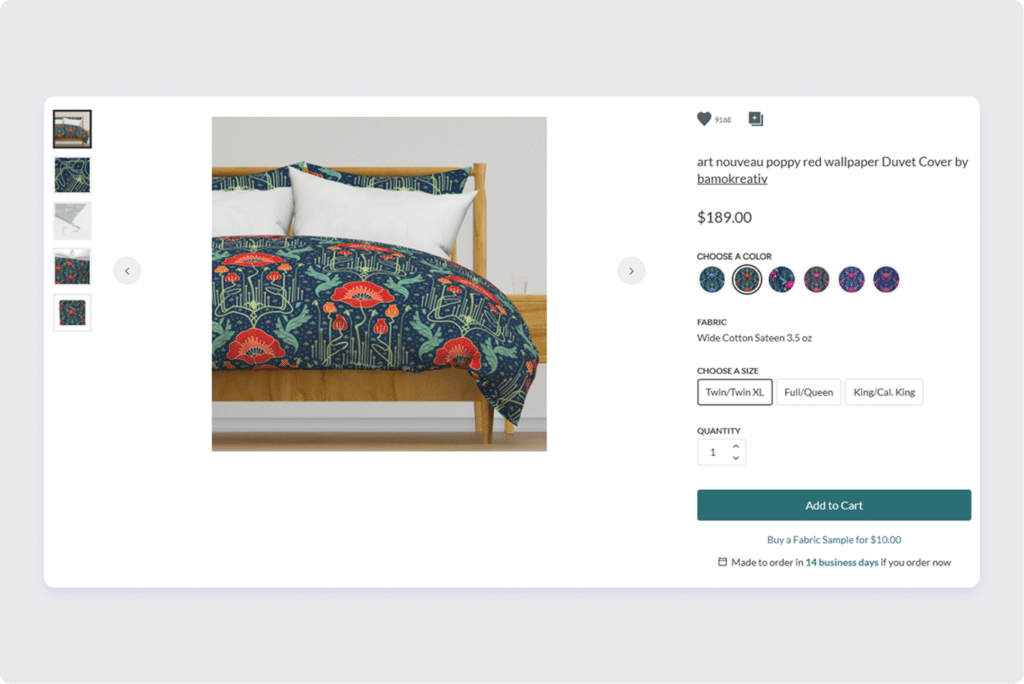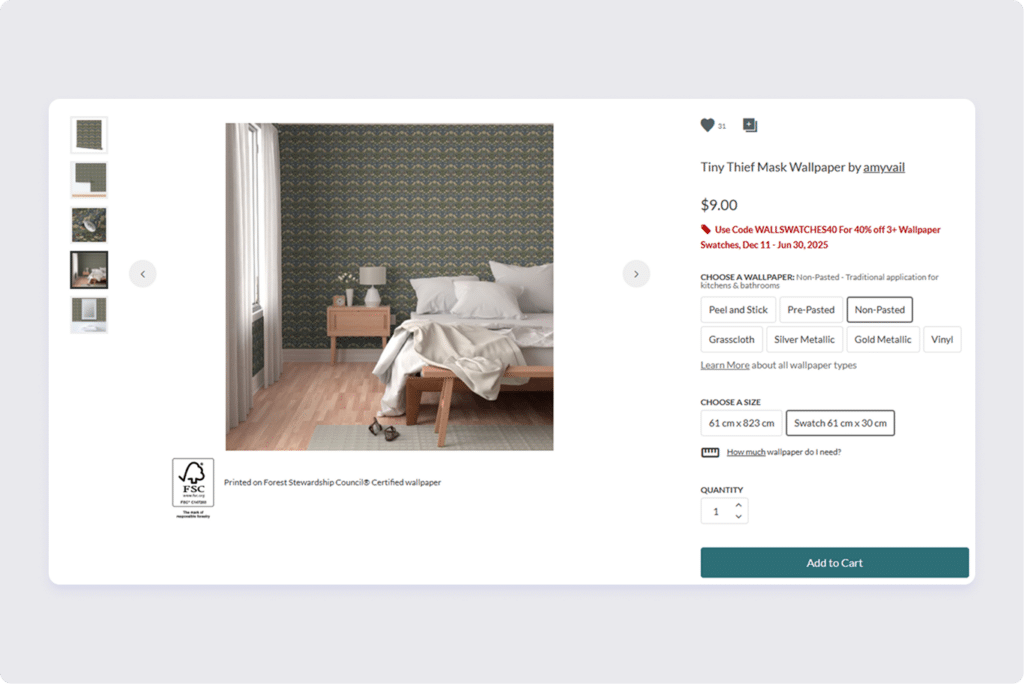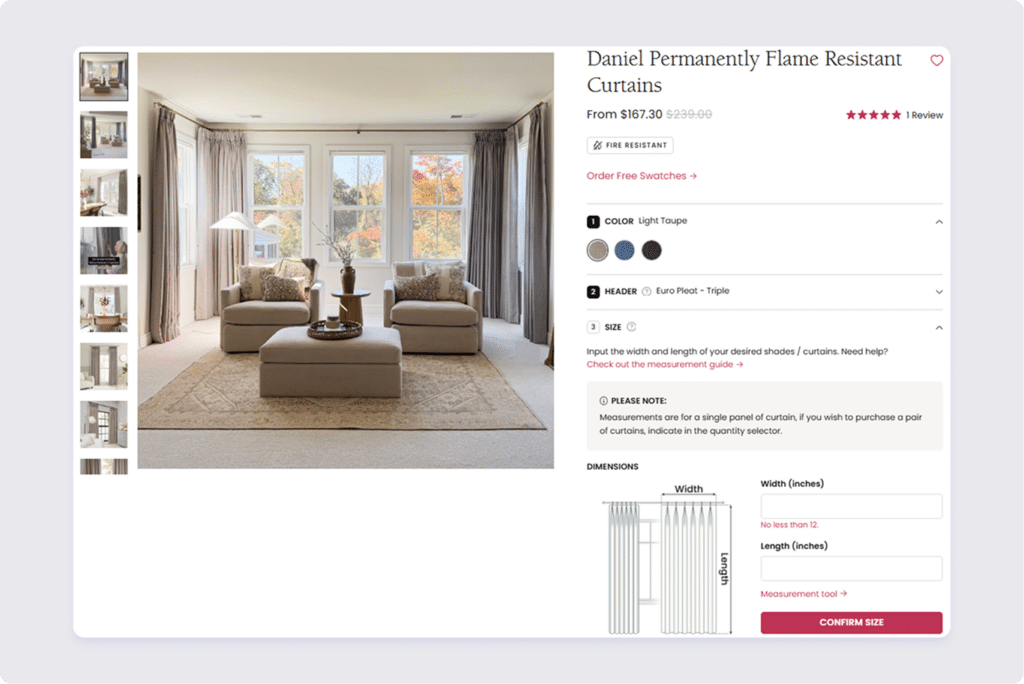Custom fabrics are booming across fashion brands, home decor, and furniture as more customers want products made specifically for them. This isn’t just a passing trend—people are actively seeking out eCommerce stores that can deliver personalized products that match their exact vision instead of settling for mass-produced alternatives.
As a Shopify merchant offering custom fabric options, you’ve probably wondered how to price these items fairly. Let’s be honest—custom work takes more time, requires special skills, and often means sourcing unique materials. Standard pricing doesn’t cut it here, and that’s completely okay.
Let’s dive into this article and find out how to make this work great for both sides and make up charging for custom design work for your business.
Understanding custom fabrics
Custom fabrics are materials modified to meet specific requirements—whether through personalized patterns, unique blends, specialized treatments, or made-to-measure specifications.
When customers want that perfect shade of blue or a pattern matching their decor exactly, expect it to be available in their shopping experience. It’s important to offer them a product customization solution.
Customers choose custom fabrics because they want something uniquely theirs. They’re seeking quality materials that address specific needs—durability for high-traffic areas or perfect color coordination with existing pieces. They’re looking for solutions that standard options can’t provide, and they recognize this added value is worth paying extra for. They don’t care – so long as they get exactly what they want for the space they live in.

Why do merchants upcharge for custom fabrics?
When you offer custom fabrics, your costs go up in ways that aren’t immediately obvious. These processes require additional time, effort, and often specialized equipment that all add to your bottom line.
Higher production costs
Custom fabric orders require specialized manufacturing processes that standard products don’t need. You might find yourself sourcing rare materials, setting up equipment for unique printing patterns, or allocating extra staff time to handle delicate handwork. These additional production steps directly increase your costs and justify appropriate upcharges.
Limited economies of scale
Custom work also means saying goodbye to the efficiency of mass production. When making standard products, you can order materials in bulk, optimize your workflow, and spread fixed costs across hundreds or thousands of identical items. With custom orders, you’re essentially starting from scratch each time. Each project requires individual setup, unique materials, and personalized quality checks that drive up per-unit costs.
Design and development expenses
Every custom project involves an often-overlooked development phase that includes creating prototypes, producing samples, and making revisions based on customer feedback. This creative process requires significant time from your most skilled team members and sometimes multiple iterations before reaching the final design. These behind-the-scenes costs are essential components of your upcharge calculation.
Premium value of personalization
Custom fabrics offer customers something truly valuable—exclusivity and uniqueness that mass-produced alternatives simply cannot provide. Your customers aren’t just paying for materials and labor; they’re investing in a one-of-a-kind product that perfectly matches their vision and needs. This added value is something many customers understand and are willing to pay a premium to receive.
Benefits of up-charging for custom fabrics
For Shopify stores
Implementing strategic upcharges for custom fabrics creates healthier profit margins that sustain your business long-term. While standard products might operate on razor-thin margins, custom work allows you to price based on value rather than competing solely on cost.
Custom fabric services position your brand as a specialized provider in the marketplace, setting you apart from mass-market competitors. Customers seeking customization are often less price-sensitive and more focused on finding the right partner who understands their vision. This market differentiation leads to stronger customer relationships, with repeat clients who return for your unique expertise rather than hunting for the lowest price.
Additionally, the made-to-order nature of custom work reduces inventory waste, as you’re producing exactly what’s needed when it’s needed.

For customers
Custom fabrics provides solutions perfectly tailored to customers’ specific requirements—whether that’s the exact shade to match existing decor, performance features for particular environments, or unique designs that can’t be found elsewhere.
This precision eliminates the compromises customers typically make when purchasing off-the-shelf products, resulting in higher satisfaction with the final outcome.
When customers invest in custom fabrics, they receive products crafted with attention to detail and quality control. These pieces often demonstrate details that mass-produced items simply can’t match.
Beyond the immediate benefits, custom pieces typically offer greater longevity and timeless appeal, as they’re designed specifically to the customer’s taste rather than following temporary trends.
Many customers also value the opportunity to support specialized skills and craftsmanship that might otherwise disappear in today’s mass-production economy.
Best practices for Shopify stores implementing upcharges
Offer tiered customization options: Set up simple, medium, and fancy options for your customers to choose from. Start with basic customization at lower prices, then offer better options with more features, and finally, top-tier choices with special materials. This way, customers can pick what works for their needs and what they can afford.

Communicate clearly with customers: Be transparent about your custom process from the start – explain the benefits of customization upfront, clearly outline your pricing structure with justifications, set realistic timelines for completion, and provide visual examples or samples whenever possible. Clear communication prevents misunderstandings and helps customers see the value in your premium pricing.
Research competitor pricing: Study what similar businesses charge for custom fabric services to ensure your pricing remains competitive while still being profitable. While understanding industry standards is important, focus on identifying and communicating your unique value rather than competing on price.
Essential tool for custom fabric pricing
Implement custom pricing calculator: Add the Apippa Custom Price Calculator app to your Shopify store to automatically generate accurate quotes for custom fabric orders. This user-friendly tool lets customers input their specific measurements, fabric choices, and customization options to see real-time pricing—eliminating the back-and-forth of manual quotes and saving you countless hours.
With Custom Price Calculator’s formula builder, you can easily set up pricing rules based on dimensions, fabric type, and customization complexity. The drag-and-drop interface requires no coding knowledge, ensuring consistent pricing for every order while giving customers instant cost transparency.
Adding an upcharge for custom fabric is about recognizing the real value you’re creating, and when done right, up-charging works for everyone.
pulvinar dapibus leo.
